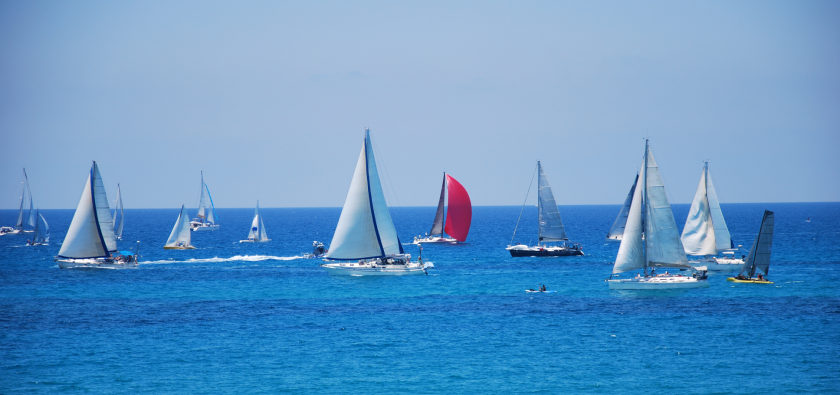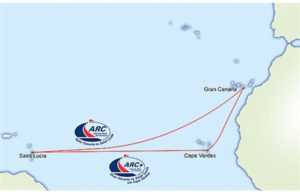The Atlantic Rally for Cruisers (ARC) is just a few weeks away. This year, 290 boats will take part in one of the most important international sailing rallies on the high seas. In fact, due to the large number of those enrolled, a new departure date has been added, the ARC San Vicente.
What is ARC 2018?
This is a rally that is held in November every year, which has been going since 1986, and crosses the Atlantic from Las Palmas de Gran Canaria to Santa Lucía in the Caribbean. There are two route options: The ARC+, which departs on 11 November, and the ARC San Vicente, which departs on 15 November, both pass through Cape Verde. The main one, which goes directly to Saint Lucia, leaves on 25 November.
Who can participate?
The ARC is not a competition rally, but is about sharing a route together and enjoying the trip. Although times are measured and there may be a certain competitive spirit, winning is not the rally’s main objective. It is for this reason that both experienced and amateur sailors, who for leisure or sport, and even couples and families who enjoy the more social side of the rally, take part in it. The trip usually lasts between 18 and 21 days depending on the weather conditions, for a 12m long boat.
Only a boat that is in good condition for ocean navigation is required to be able to take part. No particular type of boat is necessary. The only conditions are that the boat must have completed a voyage on the high seas in the year prior to the rally, that the boat must be at least 8.23 m long and have a minimum crew of two people and have certain safety and communication equipment.
The boat’s preparation
Although it is not a sporting competition, safety at sea is always an essential aspect that should not be neglected, especially at sea and on voyages of certain duration.
The event’s organisation requires some minimum security and communications equipment on board of every boat:
- Approved lifeboat with survival gear for more than 4 h.
- 406MHz EPIRB radio beacon.
- Life jackets with crotch strap and spray hood for all the crew.
- Channels enabled for sending and receiving emails at sea (e.g. satellite phone, or SSB radio with Pactor modem).
- AIS (Automatic Identification System) receiver.
In addition to these minimum requirements, we recommend that the boat is equipped with a desalination plant to provide unlimited fresh drinking water during the entire voyage. Hydration is an essential aspect of sailing on the high seas.
We do not recommend using a brand new boat for a trip on the high seas. Boats usually need a certain amount of running-in before they are 100%. It is best to start with short, near-shore crossings before embarking on crossing the Atlantic. If the boat has already been tested, in any case we suggest it be field proven: Thoroughly reviewing all navigation equipment and the boat’s conditions in general will allow us to enjoy the voyage without stress or surprises.
The crew’s preparation
The ARC organisation recommends that the skipper and at least one other crew member be trained in the use of safety and communications equipment, navigation in extreme weather conditions and management of emergency situations, in the five years prior to participation in the rally.
In addition, we recommend that as many as possible of the crew be well prepared, and have the maximum of training as possible. For example, it is always good to have knowledge of the engine or equipment maintenance, survival at sea or first aid. Even if in the end we do not need them, it will give you more peace of mind during the crossing.
With regards to physical training, we should assess our current condition and what effort or physical wear the rally will require of us, and prepare ourselves accordingly. Nor does it hurt to start progressively preparing the body for sleeping and eating rhythms before the rally. Above all, it is highly recommended to follow some dietary guidelines and hydration on board to compensate for the loss of nutrients and liquids as we sail.
If we follow the usual recommendations for sailing on the high seas and prepare both the boat and the crew properly, all that is left is to enjoy the Atlantic in this new edition of the ARC. We’re leaving shortly!
Sources: World Cruising, Eco-Sistems









